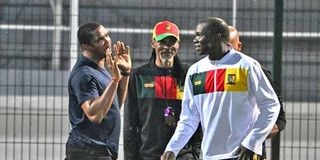Cameroon faces internal inquest after Afcon exit

Cameroon's Football Federation president Samuel Eto'o (left), Cameroon's head coach Rigobert Song (centre) and Cameroon's forward Vincent Aboubakar speak together during a training session on January 26, 2024 in Bingerville on the eve of their 2024 Africa Cup of Nations match against Nigeria.
What you need to know:
- Many are asking how, Rigobert Song, a coaching greenhorn was appointed to the helm of the team and how little known players made it to the team, the way presidential appointments are made in the country.
- Many agree Song’s selection was wanting and he lacked strategy.
In Yaounde
Tongues have been wagging here following Cameroon’s exit from the ongoing Africa Cup of Nations in Cote d’Ivoire with some football pundits linking the poor performance of the five-time African to poor selection , influenced by corruption and favouritism.
Cameroon, featuring many young, inexperienced players tasting their first Afcon campaign, drew 1-1 draw against Guinea, lost 1-3 to title holders Senegal before dramatically securing a knock-out berth after a 3-2 victory over lowly rank Gambia in the preliminaries.
But the Indomitable Lions were eliminated in the round 16 by Nigeria.
Many are asking how, Rigobert Song, a coaching greenhorn was appointed to the helm of the team and how little known players made it to the team, the way presidential appointments are made in the country.
Many agree Song’s selection was wanting and he lacked strategy.
Song seemed to confirm his shortcomings when he admitted the team lacked an offensive midfielder yet he dropped capable players in that position the likes of Pierre Kunde Malong and Eric Maxime Choupo Moting.
Instead the coach decided to build his team around wingers, notably Georges Kevin Nkoudou.
Unfortunately the team lacked the same attacking threat from the right making their play unbalanced, according to Francis Ajumane a football writer.
“Most of our attacks are built from the left. That is why I still don't understand why Song did not take Jerome Ngom along to the Afcon. I feel he would have provided the much needed balance on the right,” Ajumane added.
Ngom unselfishly served Aboubakar Vincent a cutback which the forward headed into the net to give Cameroon the lone goal and victory over Brazil at the World Cup in Qatar.
Song included two home-based players in his 27-man squad -- Leonel Ateba of Dynamo from Douala and Nathan Douala of Victoria United.
Many fans have questioned how the players from two clubs, whose bosses have close ties with Samuel Eto’o Fils, president of the Cameroon Football Federation (Fecafoot), were selected.
The list was released a few days after Emmanuel Mahop top goal scorer of the last season (then with Canon of Yaounde) won the Cameroonian men's Ballon d'Or and , Most Valuable Player of the country's 2023 MTN Elite One football championship. Surprisingly, the Coton Sport of Garoua striker was not included.
Song also left out right back , Fai Collins, who was instrumental in Cameroon’s qualifying campaign on grounds he had no club at the time, but took four goalkeepers to Cote d’Ivoire including Davies Epassy who had not played for over two months.
Some fans suspect there was favouritism and corruption involved in selection.
Eto’o who became president of Fecafoot in December 2021, has been under investigation in the country for “abuse of authority and corruption” following allegations of match-fixing.
This came after a Spanish court slammed the former Barcelona striker a 22-month suspended prison sentence and fine of $1.7m (about Sh272.85) after pleading guilty to a charge of tax fraud linked to his image rights during his days in Spain.
Back home, analysts say call ups to the national team are tele-guided by Eto’o who influenced the appointment of his former teammate as head coach. These call ups and play time are also based on friendship.
“Cronyism is possible and has been the stock-in-trade of Eto'o and Song”, says Cameroonian sports analyst, Franklin Sone Bayen.
Former internationals Eto’o and Song have come a long way and are not new in exerting undue influence in the national team.
Back in the mid-2000s, there was a code known as “1984” referring to a group of old manipulators of the Cameroon national team who pulled the strings, influenced coaches and even ministers and decided who were selected to played.
The code referred to jersey numbers of Idriss Carlos Kameni (1), Samuel Eto'o (9) Geremi Njitap (8) and Rigobert Song (4).
The curious twist though is that Song – and to a lesser extent Njitap and Kameni later became victims of (Eto’o).
Upon the arrival of Paul Le Guen in 2009, Eto'o toppled Song as captain. Song barely managed to make it to both Afcon 2010 and World Cup 2010.
“That was part of the reason that led to the Alex Song-Achille Emana-led rebellion in the Lions’ camp that partly wasted Cameroon's obvious great potentials in both 2010 tournaments and the 2014 World Cup in Brazil,” Bayen recalls.
Bayen charges without proof that their are players who are ready to offer part of their earning to the coaches to secure selection.
Bayen, who has covered several international football tournaments including World Cups, recalls that at the 1990 World Cup, Manga Onguene, one of three assistants of Russian coach, Valeri Nepomniachtchi, was accused of monetizing selection of players.
There have been stories of other coaches and football federation officials collecting money from players.
French investigative journalist, Romain Molina revealed last year that Cameroon and Ghana football officials asked for money from players to include them in the national team.
Both federations denied the allegations.





